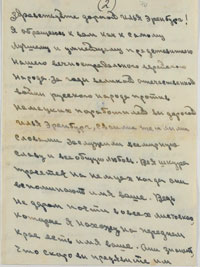Veniamin Galiuz was born in 1911 in Brailov, Ukraine. To the best of our knowledge, he was living in Vinnitsa just before the war.
During the first days of the war, after Nazi Germany invaded the Soviet Union on June 22, 1941, he was drafted into the Red Army. First he fought on the Southern Front then, from January 1942, on the Volkhov and Leningrad Fronts. In 1944 he took part in the liberation of Lithuania and Poland from the Nazi occupation. In April 1945, as a senior sergeant, he served as an instructor in chemical warfare in a high-caliber howitzer artillery brigade. Although it turned out that chemical weapons were not used during World War II, every Red Army military subunit had people who were responsible for reacting to possible chemical attacks. However, since they were not participating in the combat activity they had trained for, chemist-soldiers like Galiuz often fulfilled other functions. Veniamin Galiuz’s award certificate stated that on more than one occasion he evacuated wounded Red Army men from the battlefield. In Berlin he thus saved the wounded commander of an intelligence unit and brought him to a hospital. For such service and bravery Galiuz was awarded the Defense of Leningrad Medal and the Order of the Red Star.
In 1945 Veniamin Galiuz sent a letter to Ilya Ehrenburg, the most popular Soviet correspondent, whose articles included information about the Nazi mass murder of Jews. Galiuz expressed his feelings about the murder of members of his family and that of the huge number of his fellow Jews by the Nazis, as well as his concern about negative, hostile attitudes toward Jews on the part of Soviet people, as well. He expressed the feelings of a simple provincial Jew and his letters had a number of historical inaccuracies. Although his personality had been formed under Soviet conditions, as noted above, he was familiar with the Jewish traditions kept by his family. In his letter one senses his nostalgia for the traditional Jewish culture that was destroyed along with those whose lives embodied it.
Letter of Veniamin Galiuz to Ilya Ehrenburg
Excerpt from the 1945 letter of Veniamin Galiuz to Ilya Ehrenburg:
“… Those bloodthirsty bandits shot 44 members of my family, including my sisters, and parents; the family of my brother they buried alive. I am seeking an answer why they [the Nazis] destroyed them and I can’t find one. My heart is pained not [only] for my relatives who were murdered but [also] for the six and one half million. I have travelled across almost all of Estonia, Lithuania, and Poland but nowhere have I met a single Jew, only [deserted] little houses in towns and villages as if they were weeping for their [former] inhabitants.
Recently we occupied an observation point in the attic of a house in a Polish town that we had just liberated. And there in that attic I found many Jewish books which seemed to also be weeping for their owners. There the Jews were shot in 1940. I am not religious, but when I picked up a Pesach [Passover] haggadah and began to read it, tears began falling from my eyes like rivers.
Dear Ilya Ehrenburg! Our people sees in you a person like Moses of ancient times. And just because of this I decided to turn to you and pour out my pained soul before you. A bitter fate has overcome our unhappy people. Sometimes I ask myself: why do they persecute us everywhere? Why are we eternally hounded and why do people say about us that we are not capable of anything? Why do they all beat us so without tiring of it? Are we really worse than other peoples?...”
Mordekhai Al'tshuler, Itskhak Arad, Shmuel Krakovskii, Sovetskie evrei pishut Il’e Erenburgu (Soviet Jews Write to Ilya Ehrenburg), Jerusalem, 1993, pp. 202-203.







